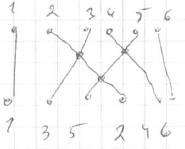Merge Sort
Sorting algorithm based on Divide and Conquer computational paradigm
Algorithm
MergeSort(array $a$):
- split $a$ into 2 halves
- sort them recursively
- merge the result
Implementation
Java
```tera term macro public int[] mergeSort(int[] input) { int n = input.length; if (n <= 1) { return input; }
int middle = n / 2;
int leftUnsorted[] = Arrays.copyOfRange(input, 0, middle);
int rightUnsorted[] = Arrays.copyOfRange(input, middle, n);
int left[] = mergeSort(leftUnsorted);
int right[] = mergeSort(rightUnsorted);
return merge(left, right); }
public int[] merge(int[] left, int[] right) { int leftLen = left.length, rightLen = right.length; int res[] = new int[leftLen + rightLen];
int leftIndex = 0, rightIndex = 0, resIndex = 0;
while (leftIndex < leftLen && rightIndex < rightLen) {
if (left[leftIndex] <= right[rightIndex]) {
res[resIndex] = left[leftIndex];
leftIndex++;
resIndex++;
} else {
res[resIndex] = right[rightIndex];
rightIndex++;
resIndex++;
}
}
while (leftIndex < leftLen) {
res[resIndex] = left[leftIndex];
leftIndex++;
resIndex++;
}
while (rightIndex < rightLen) {
res[resIndex] = right[rightIndex];
rightIndex++;
resIndex++;
}
return res; } ```
Scala
def msort(xs: List[Int]): List[Int] = {
val n = xs.length / 2
if (n == 0) {
xs
} else {
val (fst, snd) = xs splitAt n
merge(msort(fst), msort(snd))
}
}
def merge(xs: List[Int], ys: List[Int]) = xs match {
case Nil => ys
case x :: xs1 =>
ys match {
case Nil => xs
case y :: ys1 =>
if (x < y) x :: merge(xs1, ys)
else y :: merge(xs, ys1)
}
}
Applications
Counting Inversions
With little modification the merge sort algorithm can be turned in the counting inversions algorithm.
Goal
- Input: array $A$ containing $1..n$ in some arbitrary order
- Output: number of inversions
- i.e. number of pairs $(i, j)$ of array indices with $i < j$ and $A[i] > A[j]$
Motivation
- how close are the two ranked lists?
- i.e. of 2 friends with movies
Example
- 1 3 5 2 4 6
- <img src=”
 ” >
” > - if we write the sorted input and the given input, number of crosses would be number of inversions
- <img src=”
 ” >
” > - inversions are $(3,2)$, $(5,2)$, $(5,4)$
Brute force is not an option: $\Theta(n^2)$ time
Basic idea:
- insertion $c(i, j)$ is
- ’'’left’’’, if $i, j \leqslant \frac{n}{2}$
- ’'’right’’’, if $i, j > \frac{n}{2}$
- ’'’split’’’ if $i \leqslant \frac{n}{2} < j$
Algorithm
count(array $A$, length $n$): [idea]
- if $n$ = 1 return 0
- $X$ = count(1st half of $A$, $n / 2$)
- $Y$ = count(2nd part of $A$, $n / 2$)
- $Z$ = count-split($A$, $n$)
- return $X + Y + Z$
Count split should be linear to get $O(n \log n)$ running time. So we may modify merge sort and get:
count-and-sort(array $A$, length $n$):
- // B - sorted version of 1st half, C - of 2nd, D - (A, B) merged
- if $n$ = 1 return 0
- $(B, X)$ = count-and-sort(1st half of $A$, $n/2$)
- $(C, Y)$ = count-and-sort(2nd half of $A$, $n/2$)
- $(D, Z)$ = count-split($A$, $n$)
- return $(D, X + Y + Z)$
merge-count-split:
- while merging the two sorted subarrays, count the number of split inversions
- when element of 2nd array C is copied to output D
- increment total by number of elements remaining in 1st array B
Example
- consider merging (1, 2, 3) {L} with (2, 4, 6) {R}
- when 2 is copied to the output, it discovers the split inversions (3, 2) and (5, 2)
- when 4 is copied, it finds (5, 4)
- when in R element is less than in L - that’s an inversion| | |
Implementation
```tera term macro public Pair<int[], Long> countAndSort(int[] input) { int n = input.length; if (n == 1) { return Pair.of(input, 0L); }
int middle = n / 2; int leftUnsorted[] = Arrays.copyOfRange(input, 0, middle); int rightUnsorted[] = Arrays.copyOfRange(input, middle, n);
Pair<int[], Long> left = countAndSort(leftUnsorted); Pair<int[], Long> right = countAndSort(rightUnsorted); Pair<int[], Long> split = countSplitAndMerge(left.getLeft(), right.getLeft());
return Pair.of(split.getLeft(), left.getRight() + right.getRight() + split.getRight()); }
public Pair<int[], Long> countSplitAndMerge(int[] left, int[] right) { int leftLen = left.length, rightLen = right.length; int sortedOutput[] = new int[leftLen + rightLen];
int leftIndex = 0, rightIndex = 0, resIndex = 0;
long inversions = 0;
while (leftIndex < leftLen && rightIndex < rightLen) {
if (left[leftIndex] <= right[rightIndex]) {
sortedOutput[resIndex] = left[leftIndex];
leftIndex++;
resIndex++;
// nothing
} else {
sortedOutput[resIndex] = right[rightIndex];
rightIndex++;
resIndex++;
int remainedInLeft = leftLen - leftIndex;
inversions = inversions + remainedInLeft;
}
}
while (leftIndex < leftLen) {
sortedOutput[resIndex] = left[leftIndex];
leftIndex++;
resIndex++;
}
while (rightIndex < rightLen) {
sortedOutput[resIndex] = right[rightIndex];
rightIndex++;
resIndex++;
}
return Pair.of(sortedOutput, inversions); }
@Override public void run() { int[] input = readInput(); Pair<int[], Long> result = countAndSort(input); out.print(result.getRight()); } ```
External Merge Sort
The merge sort algorith is very easy to extend to sort large amounts of data that don’t fit into memory - see External Merge Sort